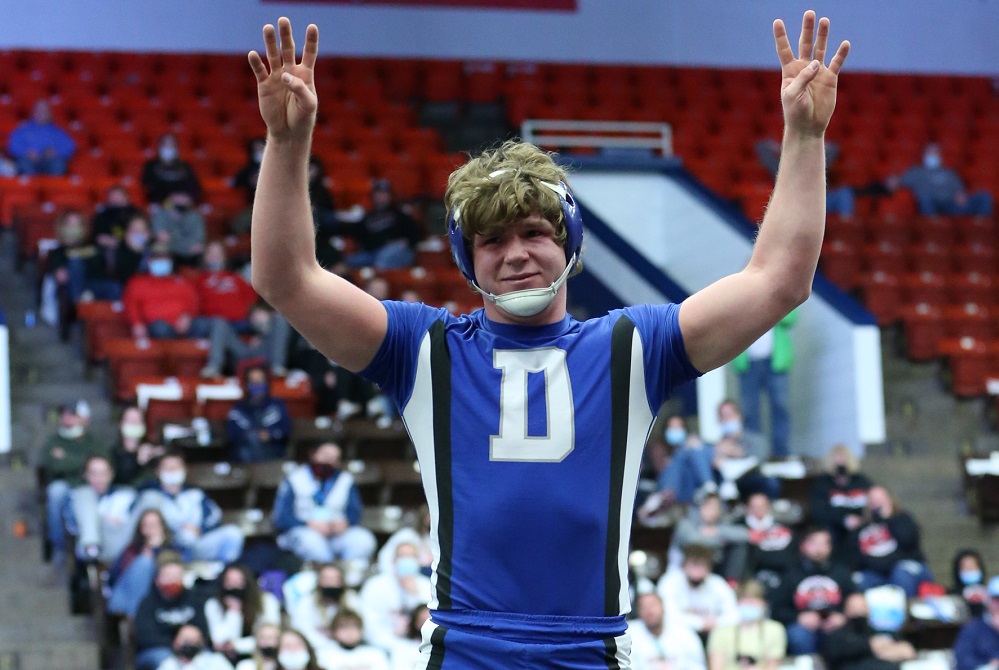
Buell Becomes 29th 4-Time Champ as Dundee Sets Finals Record
By
Geoff Kimmerly
MHSAA.com senior editor
April 3, 2021
KALALAMZOO – Stoney Buell wasn’t exactly a secret as a freshman, already considered one of the state’s best as a top-seeded contender at his first Individual Wrestling Finals in 2018. He would go on to win his first championship on the same night as teammate Brandon Whitman would become the first in Dundee history to claim a fourth Finals title.
Three years later, Buell will be leaving high school wrestling with an even bigger stack of accomplishments, having more than justified those predictions of greatness.
Buell became the 29th wrestler in MHSAA history to claim a fourth Individual Finals championship Friday, earning the Division 3 title at 189 pounds at Wings Event Center. With Dundee’s fourth-straight team championship Tuesday, Buell also is now one of just three in state history to be part of four team and four individual Finals wins – joining 2020 Lowell grad Austin Boone and Davison legend Brent Metcalf, who accomplished the feat from 2002-05.
“I think it just kinda added a little bit to prove people wrong as a freshman – because people talk and it always adds a little bit of fuel,” Buell said. “Just to finally accomplish that goal that I’ve had for so long is unreal.”
Buell, who will continue at Purdue, capped his Dundee career with a 6-1 decision against Constantine senior Isaac Hall (33-2) after pins of 27 seconds, 37 seconds and 30 seconds to reach the finale.
He had won at 135 pounds as a freshman, 152 as a sophomore and 160 as a junior. He ended this shortened season 27-0 and with a career record of 160-15.
Buell also was joined by seven teammates winning titles Friday as Dundee set a Finals record with eight champions.
“I’m just beyond grateful that we got to be here right now,” Buell said. “A huge shout out to Wings Event Center, and just the sport of wrestling for allowing me to be able to wrestle right now, and be able to do it with a team that makes you better every day. I wouldn’t want to do it with anybody else.”
103
Champion: Kade Kluce, Dundee, Fr. (18-2)
Decision, 7-3, over Talan Parsons, Ovid-Elsie, Fr. (24-1)
With three champions graduating, Kluce is part of the next generation of Dundee contenders – and he’s off to the best-possible start.
Kluce handed Parsons his only defeat of the season in a matchup of standout freshmen.
“It was really important for me, my team, my family. I worked a long time for this,” Kluce said. “And it’s paid off.
“I definitely want to do it three more times.”
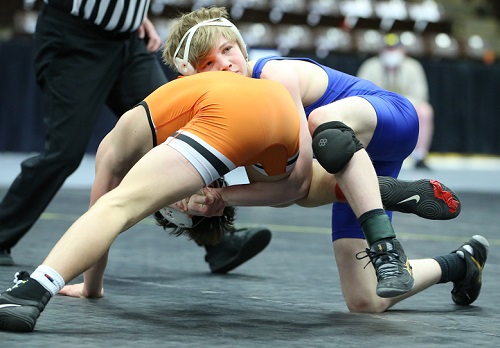
112
Champion: Braeden Davis, Dundee, Soph. (27-0)
Fall, 1:26, over Gavyn Merchant, Kingsley, Fr. (28-1)
Davis is halfway to matching Buell. And he’s blazing a similarly dominant trail.
Davis never wrestled past the second period this season, winning all of his matches by pin or tech fall including this finale to hand Merchant his only loss.
The championship followed Davis’ title at 103 a year ago.
“This year I felt more prepared and used to it,” he said. “Less nerves, and I’m used to going to big-level tournaments, so I guess it helped.
“I’m going to take a week off and I’m going right into freestyle training and getting ready for Fargo (Nationals).”
119
Champion: Kaden Chinavare, Dundee, Soph. (24-0)
Major Decision, 16-5, over Dominic Anguiano, Alma, Sr. (29-4)
Chinavare had placed third at 112 as a freshman and was ready to take his turn among the many Dundee champions over the last two seasons.
He entered as the top seed at this weight and opened with a technical fall and pin on the way to claiming that first title.
“All these guys, they train with me every day. We scrap in the wrestling room 24/7, and it feels great to finally win the first title,” he said. “It’s kinda what we work for in the room all season.”
125
Champion: Zachary Gibson, Lake Odessa Lakewood, Jr. (33-1)
Decision, 2-1, over Caeleb Ishmael, Coloma, Jr. (30-5)
Gibson jumped from finishing fifth at 103 as a freshman and fifth again at 112 last season to claim his first title. He scored a reversal in the third period and held on.
“After I got the two, I figured, I couldn’t turn the kid the first two periods … so just stay smart. State champ match, you’ve gotta stay smart,” Gibson said.
He gave Lakewood a champion at the Finals for the second straight season, after entering as the second seed at this weight and getting pins in his first two matches of the day.
“It’s really awesome, really sets an example for the rest of the guys,” Cooper said. “My team, they see me as an upperclassmen. They want to fight to get up there with me, and it’s awesome. I work with all the guys, all the underclassmen.”
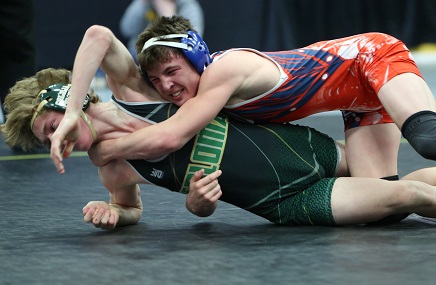
130
Champion: Ryker Johnecheck, Williamston, Jr. (27-0)
Decision, 6-2, over Brock Holek, Durand, Sr. (25-4)
Both were making repeat appearances in a championship match, Johnecheck after winning 125 last year and Holek after coming in second at 130.
Holek defeated Johnecheck’s brother Camden 5-3 in a semifinal, setting up this clash.
“I’ve wrestled him at Districts and Regionals, and I know what he likes to do,” Ryker Johnecheck said. “I was just waiting for the opportunity, and I got the takedowns when I needed to, and it turned out with me on top.”
Williamston has produced its share of champions in the past, including a pair of the best-known in MHSAA history. Johnecheck became the Hornets’ first repeat champion since Andy Simmons won his fourth title in 2002.
“We’ve had a lot of guys coming up around my age,” Johnecheck said. “We brought five guys to states today; we’ve got five placers. It’s all a team. We push each other at practice, and it shows.”
135
Champion: Aiden Davis, Dundee, Soph. (27-1)
Decision, 5-1, over Jack Sherman, Millington, Sr. (28-1)
Davis had come up just short as a freshman, losing the championship match at 125 to Johnecheck on a last-second ultimate tiebreaker takedown last winter.
After this win he talked about always getting better, by baby steps or leaps and bounds. And he finished the season by making that next move and handing Sherman his only defeat.
“This was one was pretty sweet, because last year I lost in literally the last second,” Davis said. “So I felt like this one meant something to really get it.
“I knew I deserved it last year. This year I just had to prove that.”
140
Champion: Max Brown, Whitehall, Jr. (35-1)
Decision, 7-1, over Austin Fietz, Dundee, Sr. (23-4)
Brown made some noise when he started Tuesday’s Team Final against Dundee with a win over the top-seeded Fietz, a 2020 champion.
Then it was back to preparing for a possible rematch, as Brown was the second seed in this bracket. He lined up a pair of pins Friday to earn the opportunity.
“After our match Tuesday at team states, we went back to the practice room, we worked hard, we got a strategy and went out and executed the strategy,” Brown said. “I knew what to block for, what to look for, how to keep working the whole time.”
Brown had finished third at 130 as a sophomore and fourth at 125 as a freshman.
145
Champion: Casey Swiderski, Dundee, Jr. (28-0)
Major Decision, 20-7, over Dametrius Castillo, Alma, Sr. (29-5)
It seemed appropriate that Swiderski earned not only Dundee’s last championship of the day, but also the last win of the Division 3 meet – because after this weekend, the spotlight is sure to turn his way even more.
Swiderski will have the opportunity next year to join the prestigious group of four-time champs, with Friday’s Finals win at 145 adding to his past titles at 135 as a sophomore and 103 as a freshman.
He won his first three matches this time by pin before the major decision against Castillo, who was a champion as a freshman and runner-up as a junior.
“State titles are state titles. If my goal is this high, this is just a stepping stone to my goals – Division I college, NCAAs, all that,” Swiderski said.
“Getting that fourth (would be) awesome for the history. And being one of those guys, not many people get to do that. Not many people alone get (one) state title.”
152
Champion: Nick Dodman, Sanford Meridian, Sr. (31-5)
Decision, 9-2, over Nicholas Blanchard, Whitehall, Jr. (30-7)
Dodman became his school’s third Individual Finals champion, and first since 2014 – and also Meridian’s first non-heavyweight title winner.
He made good on his top seed Friday after previous Finals finishes of sixth at 140 and eighth at 135 as a junior and sophomore, respectively.
“I knew I could beat anyone in this bracket, and that mindset helped me do it,” Dodman said. “I’d wrestled a lot of them before, and I know nobody here has put in as many hours as me. I knew they didn’t stand a chance.”
160
Champion: Tyler Swiderski, Dundee, Sr. (27-1)
Decision, 7-2, over Connor Owens, Flint Powers Catholic, Soph. (24-1)
Friday’s win over the previously-undefeated Owens came at the opening weight for this year’s Finals and kicked off the Vikings’ record run of champions while also giving Swiderski his second-straight title to go with last year’s at 145.
Swiderski had opened his high school career with Individual Finals runner-up finishes at 112 as a freshman and 135 as a sophomore. And then the key to taking the next step clicked.
“Just to wrestle my matches like I do in practice and not overthink the whole tournament,” he said.
“I think (this year) was a lot better, just because I think I was a lot more free this year,” Swiderski added, comparing his first and second championships. “And it was my last season, so I thought it was very important.”
171
Champion: Dominick Lomazzo, Dundee, Sr. (23-3)
Decision, 7-4, over Randy Pyrzewski, Gladwin, Jr. (28-2)
Lomazzo capped his career with a second-straight championship, adding to the title he won at 152 a year ago.
This run certainly was different though, even if the end result was the same. Lomazzo, who earned a pin and then a major decision to start off Friday, did it all with an ankle injury he suffered during last week’s Regional Final.
But he fought through it to finish a career that included multiple team championships as well and a third place in Division 1 at 125 as a freshman wrestling for Detroit Catholic Central.
“I’m just really happy to be part of this team. These are all my best friends,” Lomazzo said. “It just feels great to finish it out on a bang and know that I did everything I could to finish it, and I got it done.”
215
Champion: Ira Jenkins, Whitehall, Jr. (38-0)
Fall, 0:44, over Ryan Osterland, Algonac, Sr. (31-2)
Jenkins arguably had the most dominating day of any Division 3 competitor Friday, with pins in 1:28, 1:46, 19 seconds and then 44 seconds in the finale to lock down a perfect season and his first championship.
He’d previously finished third at 152 in Division 3 as a freshman and fifth at 171 in Division 2 as a sophomore.
“I wanted to come into this tournament and dominate as best I could,” Jenkins said. “I wanted to get four pins all the way through – that was just my goal, I guess. I know there’s some things I could’ve done better, but I got it done.
“Coming off last year, a fifth-place finish wasn’t where I wanted to end up. So I went back to working and learned from that, and just kept improving. All the offseason work is paying off.”
285
Champion: Dan McKiernan, Richmond, Sr. (16-0)
Decision, 3-1, over Levi Harber, Montrose, Jr. (18-3)
The McKiernans can wrestle. There’s no doubt about that.
Dan finished his high school career Friday by becoming the fourth McKiernan brother to compete in an MHSAA individual championship match – and the second from his family to win one.
McKiernan earned a last-second takedown for the go-ahead points.
“We were both tired, got barely anything left by the end,” Dan McKiernan said. “I knew it’s not worth resting toward the end of the period, so I just thought I had to get and go.”
Jake McKiernan had won the Division 3 title at 189 pounds in 2014, while Jordan McKiernan was runner-up at 152 for Richmond in 2006 and Colton McKiernan was runner-up at 189 in 2017 and 215 pounds in 2018.
“I’m so proud of it. I love my family,” said Dan, who had taken fifth at 285 as a junior. “I’m hoping they’re happy.”
PHOTOS: (Top) Dundee’s Stoney Buell raises four fingers on each hand to the crowd signifying his fourth championship won Friday at the Division 3 Individual Wrestling Finals. (Middle) The Vikings’ Braeden Davis, right, works toward a win at 112. (Below) Lakewood’s Zachary Gibson, right, maintains control during his title match win at 125. (Click for more from HighSchoolSportsScene.com.)
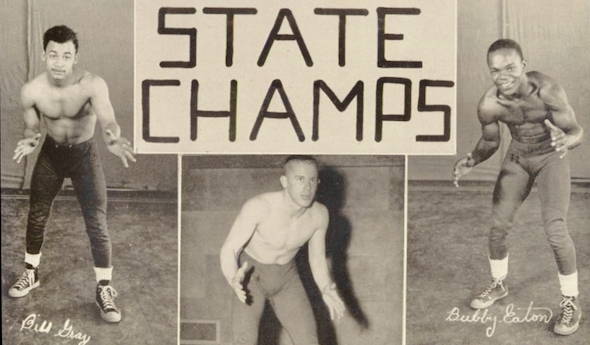
Old 5-A League Fueled Wrestling's Rise
June 29, 2020
By Ron Pesch
Special for Second Half
This latest quest into wrestling began with an inquiry, as these projects often do.
My work with the MHSAA – which includes the title ‘historian’ – is mostly a hobby that began many years ago. The diversion often gets me into press boxes and places the average sports fan doesn’t usually get to venture. Now and then, I get to talk into a microphone. But mostly, it is hours of digging; pouring through scrapbooks, yearbooks and newspapers, old and new, as I search for names, details and stories lost in time. The pursuit sometimes leads to awkward phone calls, e-mails and messages where I try to describe who I am and why I’m chasing a phone number for someone, a person’s mother or father, grandmother or grandfather.
I adore the chase and resolving mysteries. I love visiting libraries and schools and delight in connecting with people. I love filling in holes and connecting dots. I’m a computer guy by trade, focused on analyzing and aligning data. I equate sports searches to detective work, and for fans of old television, I’m like Columbo without the trench coat or cigar, always asking, “Just one more thing …”
Wrestling
My first visit to the sport was in junior high gym class. That’s when Coach Murphy paired me up against another undersized classmate. With the shrill of a whistle, we battled it out on a deep red colored mat – representative of one half of the red and grey school colors of Nelson Junior High. The struggle lasted for no more than a matter of seconds. With a slap of a mat, or perhaps another whistle, it was over. I lost by ‘fall’ – the gentler way of saying I was pinned.
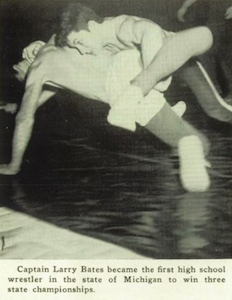 My second visit to the sport came in high school. That’s when the wrestling coach stopped me in the hall one day to suggest I join the wrestling team. Apparently, word of the skills I demonstrated at Nelson hadn’t travelled the half mile east from the junior high to the high school. Quickly recognizing this fact, I told him it might be counter-productive, as I wasn’t much of a wrestler. He was undeterred. Because I was still undersized, he said, I would likely win a fair number of matches. Many schools, it seemed, struggled to find someone to wrestle in the lower classes, and hence, would have to forfeit. I still turned him down.
My second visit to the sport came in high school. That’s when the wrestling coach stopped me in the hall one day to suggest I join the wrestling team. Apparently, word of the skills I demonstrated at Nelson hadn’t travelled the half mile east from the junior high to the high school. Quickly recognizing this fact, I told him it might be counter-productive, as I wasn’t much of a wrestler. He was undeterred. Because I was still undersized, he said, I would likely win a fair number of matches. Many schools, it seemed, struggled to find someone to wrestle in the lower classes, and hence, would have to forfeit. I still turned him down.
I give credit to the Coach Erickson. He was trying to involve a kid in athletics that wasn’t going to make the football, basketball or track team. But that bit of wisdom didn’t hit me until long after high school.
As the above may demonstrate, an extensive understanding of the intricate particulars of wrestling isn’t my strong suit. I’ve attended only one MHSAA Wrestling Final. That visit still remains among my favorite sports sights. The pageantry of the Grand March staged before the orchestrated pandemonium of the MHSAA wrestling championship combined with huge crowds and inspiring athleticism creates a spectacular event.
The Latest Project
Recently, a question, relating to past individual champions from the earliest days of the championships, arrived at the MHSAA office. The Association has awarded wrestling titles since 1948, and a list of team champions and runners-up from the beginning to the present appear on the MHSAA Website. Missing, however, are the names of the individuals who won championships between 1948 and 1960.
To find an answer, that meant a deep dive into newspapers, yearbooks and old wrestling guides to exhume the particulars from articles and agate, cross-referencing results, matching last names to first names, correcting spellings and occasionally schools when obvious errors have been made.
Technology has helped carve away some time and travel when embarking on such a project. Once, the only way to dig out such information was to travel to microfilm, and then spend hours scrolling past print. Today, thanks to some online archives, even during a global pandemic, we can visit a handful of Michigan newspapers via the internet. Tack on the ability to search the online cloud of information, intriguing elements intermittently bubble to the surface, transforming a standing list of names and schools to an account that brings at least some names to life.
The Beginnings
An initial look at the existing team championship listings revealed the first fact. For all intents and purposes, the earliest days of the MHSAA wrestling state championships served as a glorified meet for the members of the 5-A Conference. The league, comprised of Ann Arbor, Battle Creek Central, Jackson, Lansing Eastern and Lansing Sexton high schools, was where wrestling as a prep sport first gained traction in Michigan. Almost immediately, Greater Lansing established a stronghold on the sport that would last those first 13 years.
From 1948 to 1960, there was only one classification in which all schools, regardless of size, competed. In 10 of those 13 years, one of two Lansing high schools – Eastern or Sexton – won the state’s mat championship. In the three years when a Lansing team didn’t win, they finished as runner-up. Those three were part seven total of that baker’s dozen when either Eastern or Sexton finished second.
Growth in Michigan
The first championship tournament in 1948 involved around a dozen schools. While expansion into other schools commenced slowly, by 1957, wrestling had progressed into the fastest growing sport in Michigan.
“The sport blossoms into many new schools every year,” stated George Maskin in a January issue of the Detroit Times in 1957. “Best estimates are that at least 60 varsity prep teams now are in competition. The figure should come close to the 100 mark within a year or two. Prep wrestling has grown with such swiftness it now is necessary to hold regionals to determine qualifiers for the state meet.
“It is not the kind of wrestling one has watched on television or in some of the professional arenas around the state,” he added, trying to educate the public about the difference between the prep sport and the form of broadcast entertainment then popular. “Groans and grunts have no part in high school wrestling … nor does hair pulling or stamping the feet … or pointing a finger into the referee’s eye.”
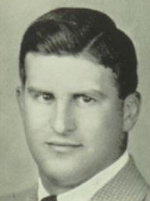 Coaches of wrestling noted that it was one of the few sports offered that gave equal opportunity to students regardless of their physical build. Separated into 12 weight classifications, running from 95 pounds and under up to the unlimited, or heavyweight division, there was a place for all.
Coaches of wrestling noted that it was one of the few sports offered that gave equal opportunity to students regardless of their physical build. Separated into 12 weight classifications, running from 95 pounds and under up to the unlimited, or heavyweight division, there was a place for all.
“Take the kid who weighs 95 pounds,” Ignatius ‘Iggy’ Konrad, a former wrestler at Michigan State and the coach at Lansing Sexton, told Maskin. “He’ll participate against a boy of similar weight. Thus a kid whose athletic possibilities might appear hopeless (in other sports) finds a place for himself in wrestling.”
As the sport continued to expand, coaches were still trying to explain the worth.
“Parents should try to understand the difference between television wrestling and high school and college wrestling,” Grandville coach Kay Hutsell told a Grand Rapids Press reporter in December 1960. “There is no comparison. TV is 100 percent acting.”
A state champion wrestler as a high school student in Illinois, where spectator interest and participation was far greater than in those early days of wrestling in Michigan, Hutsell twice lettered in the sport at Indiana University.
“Wrestling is a conditioner and perhaps develops the body better than any other sport. About the only way wrestling can educate the adults (in the western Michigan area about the sport) is through newspapers.” He felt people should come to “see for themselves.”
The Tournament
Lansing Sexton won the state’s inaugural team wrestling title, 54-43 over the Ann Arbor Pioneers, with the event run off on the mats of the University of Michigan in 1948. Both Floyd Eaton at 127 pounds and Carl Covert at 133 ended the year undefeated for the Big Reds. Five wrestlers from each school earned individual titles that first year. Jackson’s heavyweight, Norm Blank, scored a pin over Sexton’s Dick Buckmaster. The pair had split their two previous matches during league competition.
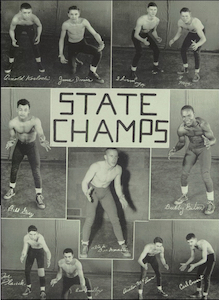 Ann Arbor grabbed the next two MHSAA team titles, both by a mere four points, first 60-56 over Sexton, then topping the Quakers of Lansing Eastern, 56-52, in 1950.
Ann Arbor grabbed the next two MHSAA team titles, both by a mere four points, first 60-56 over Sexton, then topping the Quakers of Lansing Eastern, 56-52, in 1950.
Eight wrestlers qualified for the final round for both Ann Arbor and Sexton in 1949, with five each earning championships. Both schools had three wrestlers finish in third and fourth place; hence the team title was awarded based on Ann Arbor tallying more pins. A total of 96 wrestlers from 11 schools participated in the tournament. Ted Lennox, wrestling at 95 pounds, became the first athlete from the Michigan School for the Blind to compete for an individual title but was defeated by Sexton’s Leo Kosloski. Lennox would later wrestle for Michigan State.
In 1950, nine Ann Arbor wrestlers advanced to the final round with six seizing championship medals, but only Sam Holloway repeated as champion from the previous year. Teammate Jack Townsley, who had won in 1949 at 112 pounds, finished second at 120.
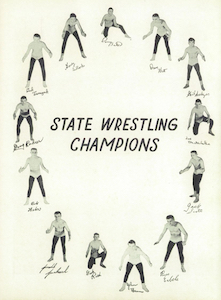 Eastern and coach Don Johnson grabbed the first of two consecutive titles in 1951, topping Ann Arbor, 56-52, with East Lansing finishing a distant third with 26 points. Pete Christ of Battle Creek Central became the first Bearcat (and only the second athlete from a school other than Eastern, Sexton or Ann Arbor) to bring home an individual wrestling title, with a decision over Lansing Eastern’s Vince Malcongi in the 140 classification. “The Bearcat matmen took fourth in the State,” according to the Battle Creek yearbook. “Mr. Donald Cooper took over the coaching duties when Mr. Allen Bush was called to the Marines.” (Bush would later serve as executive director of the MHSAA).
Eastern and coach Don Johnson grabbed the first of two consecutive titles in 1951, topping Ann Arbor, 56-52, with East Lansing finishing a distant third with 26 points. Pete Christ of Battle Creek Central became the first Bearcat (and only the second athlete from a school other than Eastern, Sexton or Ann Arbor) to bring home an individual wrestling title, with a decision over Lansing Eastern’s Vince Malcongi in the 140 classification. “The Bearcat matmen took fourth in the State,” according to the Battle Creek yearbook. “Mr. Donald Cooper took over the coaching duties when Mr. Allen Bush was called to the Marines.” (Bush would later serve as executive director of the MHSAA).
Johnson’s squad absolutely dominated the field in 1952, topping Sexton the next year, 68-43. Ann Arbor followed with 39 points. Seven Quakers – George Smith (95), Herb Austin (103), Jim Sinadinos (127) Bob Ovenhouse (133), Bob Ballard (138), Ed Cary (145) and Norm Thomas (175) – all won their final matches. Both Austin and Sinadinos were repeat champions.
Sexton flipped the table in 1953 with a 67-46 win over Eastern. Ten Big Reds competed for individual state championships among the 12 classifications, with five taking home titles. The Big Reds’ Ken Maidlow, jumping from 165 pounds to 175, and Eastern’s Ed Cary, who moved up to 154, both repeated as medal winners. In the heavyweight class, Sexton’s Ray Reglin downed Steve Zervas from Hazel Park. (Zervas, a two-time runner-up, later wrestled at the University of Michigan, then coached wrestling at Warren Fitzgerald for 34 seasons and served as mayor of Hazel Park from 1974 to 1986).
In 1954, Ossie Elliott of Ypsilanti and Henry Henson of Berkley became the first wrestlers from non 5-A schools to win individual state wrestling titles. Elliott, who had finished as state runner-up in 1953 at 133 pounds, downed Lansing Sexton’s Tom Holden in the same classification. Henson earned a decision over Lansing Eastern’s Ken Bliesener at 154 pounds. Eastern again returned to the winner’s circle, outdistancing Sexton, 60-44. Ypsilanti finished third with 34 points.
By 1955, athletes from 28 high school teams were battling for state team and individual honors on the mats at MSC’s Jenison Field House. As a senior captain, Lansing Eastern’s Larry Bates pinned four out of five opponents in the 112-pound class to become Michigan’s first wrestler to earn three state crowns. Bates grabbed his first title in 1953, competing at 95 pounds, followed by his second in 1954 at 103. Eastern picked up its second-straight team trophy, racking up 102 points on the way to a fourth crown in the eighth year of championships. For the first time, a non-5-A school finished second, as the Ypsilanti Braves grabbed runner-up honors with 84 points.
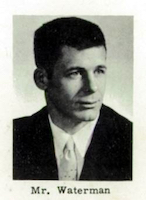 Coach Bert Waterman led Ypsilanti to the first of four championships during a 10-year span in 1956. Two Braves, Ambi Wilbanks and Walt Pipps, earned titles while three others finished second in their classifications. Ypsi had lost one dual meet during the regular season, to Lansing Eastern, by a slim three-point margin. With the 1967-68 school year, Waterman would embark on a 24-year career as coach at Yale University after posting a 192-35-4 mark in 16 seasons at Ypsilanti. A 1950 graduate of Michigan State, the former Spartans wrestler would join Eastern’s Don Johnson, Sexton’s Iggy Konrad, Fran Hetherington from the School for the Blind and two other high school coaches as a charter member of the Michigan Wrestling Hall of Fame in November 1978.
Coach Bert Waterman led Ypsilanti to the first of four championships during a 10-year span in 1956. Two Braves, Ambi Wilbanks and Walt Pipps, earned titles while three others finished second in their classifications. Ypsi had lost one dual meet during the regular season, to Lansing Eastern, by a slim three-point margin. With the 1967-68 school year, Waterman would embark on a 24-year career as coach at Yale University after posting a 192-35-4 mark in 16 seasons at Ypsilanti. A 1950 graduate of Michigan State, the former Spartans wrestler would join Eastern’s Don Johnson, Sexton’s Iggy Konrad, Fran Hetherington from the School for the Blind and two other high school coaches as a charter member of the Michigan Wrestling Hall of Fame in November 1978.
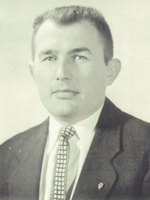 Runner-up in 1956, Eastern grabbed another title in 1957 topping Battle Creek Central, 93-89, in the tournament standings. It was a surprise “going away present” for Coach Don Johnson, who was stepping away after 10 seasons of coaching the Quakers to accept the assistant principal position at Eastern. Battle Creek had five wrestlers advance, and held a 56-48 lead over Eastern as the teams entered the final round. The Quakers’ Ted Hartman opened the day with a victory in the 98-pound weight class, helping Eastern post a 3-1 record in championship round matches. Sexton assisted with the Eastern victory when Norm Young defeated Battle Creek’s Bob McClenney in the 120 weight class. The Bearcats, who had five wrestlers in the finals, ended with two individual champs on the day and their highest finish in their 10 seasons of wrestling.
Runner-up in 1956, Eastern grabbed another title in 1957 topping Battle Creek Central, 93-89, in the tournament standings. It was a surprise “going away present” for Coach Don Johnson, who was stepping away after 10 seasons of coaching the Quakers to accept the assistant principal position at Eastern. Battle Creek had five wrestlers advance, and held a 56-48 lead over Eastern as the teams entered the final round. The Quakers’ Ted Hartman opened the day with a victory in the 98-pound weight class, helping Eastern post a 3-1 record in championship round matches. Sexton assisted with the Eastern victory when Norm Young defeated Battle Creek’s Bob McClenney in the 120 weight class. The Bearcats, who had five wrestlers in the finals, ended with two individual champs on the day and their highest finish in their 10 seasons of wrestling.
An All-American wrestler at Michigan State, Johnson would remain at Eastern throughout his education career, retiring as principal in 1983. The fieldhouse at Eastern was named after him in December 1984, fittingly just prior to the championship round of the annual Eastern High Wrestling Invitational.
Eastern again went back-to-back, topping Sexton, 88-57, with Ypsilanti third in the 1958 championship standings. The meet, culminating with 16 boys competing in each weight division – four each from regionals hosted at Battle Creek, Lansing, Ypsilanti and Berkley – was held at the Intramural Building at the University of Michigan. Both Eastern and Sexton advanced four wrestlers to the final round, with Eastern’s Gary Gogarn (95), Ron Parkinson (145) and Alex Valcanoff (154) earning titles. For Sexton, Fritz Kellerman (133) and Wilkie Hopkins (138) finished on top.
The 1959 championships, hosted at the new intramural building at MSU, found boys from 47 schools chasing medal honors.
“Points toward the team title are awarded one for each bout won, with an extra point for a fall,” noted the Lansing State Journal, explaining the mechanics of the tournament. “The big scoring chance comes (in the final round) with a first place netting 10 points, second 7, third 4 and fourth 2.”
Jackson and Sexton had tied for the 6-A Conference crown (the league renamed with the addition of Kalamazoo Central to the mix) and the race to the MHSAA title was expected to be a tight one. Jackson qualified seven for the semifinal round, with four advancing to the championships. The Big Reds sent five wrestlers to the last round. Vikings Ron Shavers (95), Nate Haehnle (145) and Don Mains (165) had each won matches, while Sexton’s qualifiers Tom Mulder (127) and Emerson Boles (175) had earned titles.
With one match remaining, Jackson trailed Iggy Konrad’s Big Reds by four, 67-63, as the Vikings’ Ed Youngs – the state’s reigning heavyweight champion – squared off with Sexton’s Mickey Devoe. Youngs grabbed a 3-1 decision to repeat, but the Vikings needed a fall in the match for a tie. Hence, the Big Reds eked out a single-point victory, 74-73, to escape with their third state mat title.
The results of the title round of the 1960 tournament, also won by Sexton, telegraphed how far the sport had come. Wrestlers from a dozen high schools squared off for honors in the title matches, with winners representing 10 cities. The Big Reds topped Ypsilanti 70-64, followed by Kalamazoo Central with 56 points. Eight other schools had scored at least 20 points in the tournament; 31 teams had scored at least a point. Tom Mulder of Sexton was the lone repeat champion.
With 112 schools now offering wrestling on their sports menu, the MHSAA split the event into two parts for the 1959-60 school year, with Class A set for the University of Michigan and Class B hosted by Michigan State University. The sport was now in full bloom.
 Ron Pesch has taken an active role in researching the history of MHSAA events since 1985 and began writing for MHSAA Finals programs in 1986, adding additional features and "flashbacks" in 1992. He inherited the title of MHSAA historian from the late Dick Kishpaugh following the 1993-94 school year, and resides in Muskegon. Contact him at [email protected] with ideas for historical articles.
Ron Pesch has taken an active role in researching the history of MHSAA events since 1985 and began writing for MHSAA Finals programs in 1986, adding additional features and "flashbacks" in 1992. He inherited the title of MHSAA historian from the late Dick Kishpaugh following the 1993-94 school year, and resides in Muskegon. Contact him at [email protected] with ideas for historical articles.
PHOTOS: (Top and 4) Lansing Sexton won the first MHSAA Finals in wrestling in 1948. (2) Eastern’s Larry Bates became the first three-time individual champion in MHSAA history in 1955. (3) The Big Reds were led by coach Ignatius Konrad. (5) Lansing Eastern kept the championship in the capital city in 1949. (6) Bert Waterman built one of the state’s top programs at Ypsilanti. (7) Don Johnson was the architect of Eastern’s program.(Photos gathered by Ron Pesch.)

